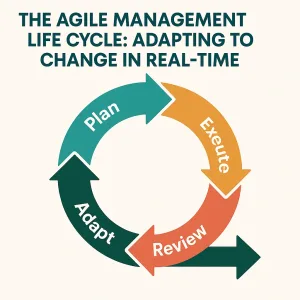Introduction
The role of a Data Analyst Project Manager has emerged as a vital hybrid position that combines the analytical prowess of data analysis with the organizational skills of project management. This unique role is designed for professionals who can navigate both the intricacies of data interpretation and the complexities of managing projects effectively.
Definition of a Data Analyst Project Manager
A Data Analyst Project Manager is a professional who oversees projects while leveraging data analytics to inform decision-making processes. This role involves not only managing project timelines, resources, and teams but also analyzing data to derive insights that can enhance project outcomes. By integrating data analysis into project management, these professionals ensure that projects are not only completed on time and within budget but also aligned with strategic goals based on empirical evidence.
Importance of Data-Driven Decision-Making in Project Management
In an era where data is abundant, the ability to make informed decisions based on data analysis is crucial. Data-driven decision-making allows project managers to:
- Identify Risks and Opportunities: By analyzing historical data, project managers can foresee potential challenges and opportunities, enabling proactive planning.
- Enhance Efficiency: Data insights can streamline processes, optimize resource allocation, and improve overall project efficiency.
- Measure Success: Establishing key performance indicators (KPIs) based on data allows for better tracking of project success and areas for improvement.
Overview of the Career Landscape and Demand for Hybrid Roles
The demand for hybrid roles, such as Data Analyst Project Managers, is on the rise as organizations increasingly recognize the value of combining analytical skills with project management expertise. According to industry trends, companies are seeking professionals who can bridge the gap between data analysis and project execution. This trend is driven by:
- Increased Complexity of Projects: As projects become more data-intensive, the need for professionals who can manage both the analytical and operational aspects is growing.
- Focus on Agility and Adaptability: Organizations are looking for project managers who can adapt to changing data landscapes and make quick, informed decisions.
- Career Advancement Opportunities: For career changers and students, pursuing a path as a Data Analyst Project Manager not only opens doors to diverse job opportunities but also positions them at the forefront of a critical intersection in the job market.
Understanding the Role of a Data Analyst Project Manager
As the demand for data-driven decision-making continues to rise, the role of a Data Analyst Project Manager has emerged as a vital hybrid position that combines the analytical prowess of a data analyst with the organizational skills of a project manager. This section aims to clarify the responsibilities and skills required for this unique role, providing valuable insights for career changers and students looking to future-proof their careers.
Key Responsibilities of a Data Analyst Project Manager
A Data Analyst Project Manager is tasked with a variety of responsibilities that bridge the gap between data analysis and project management. Key responsibilities include:
- Data Collection and Analysis: Gathering relevant data from multiple sources, analyzing it to derive insights, and ensuring that the data is accurate and actionable [5][15].
- Project Oversight: Leading projects from inception to completion, which includes creating project timelines, managing budgets, and ensuring that project goals align with business objectives [11].
- Reporting and Presentation: Creating comprehensive reports that communicate findings and insights to stakeholders, ensuring that complex data is presented in an understandable manner [7][10].
- Team Coordination: Overseeing a team of analysts and IT staff, facilitating collaboration, and ensuring that all team members are aligned with project goals [4][11].
- Stakeholder Engagement: Communicating with stakeholders to understand their needs, manage expectations, and present data-driven recommendations [10][12].
Essential Skills
To excel as a Data Analyst Project Manager, individuals must possess a diverse set of skills, including:
- Data Analysis: Proficiency in statistical analysis methods, data visualization techniques, and familiarity with programming languages such as Python, R, and SQL are crucial for interpreting data effectively [3][8].
- Project Management: Strong project management skills are necessary to oversee project timelines, budgets, and deliverables, ensuring that projects are completed on time and within scope [4][11].
- Communication: Excellent writing and verbal communication skills are essential for clearly articulating findings and insights to both technical and non-technical stakeholders [4][5].
- Stakeholder Management: The ability to engage with various stakeholders, understand their requirements, and manage their expectations is vital for the success of any project [10][12].
Difference Between Traditional Project Management and Data-Driven Project Management
While traditional project management focuses on the execution of projects based on predefined plans and processes, data-driven project management emphasizes the use of data to inform decision-making and project direction. Key differences include:
- Decision-Making: In traditional project management, decisions are often based on experience and established practices. In contrast, data-driven project management relies on data analysis to guide decisions, making the process more objective and evidence-based [9].
- Flexibility and Adaptability: Data-driven project management allows for more flexibility, as project managers can adjust strategies based on real-time data insights, whereas traditional methods may adhere strictly to initial plans [9].
- Outcome Measurement: Data-driven project management places a strong emphasis on measuring outcomes through data analytics, enabling project managers to assess the effectiveness of their strategies and make necessary adjustments [9][10].
Educational Pathways and Certifications
As the demand for data-driven decision-making continues to rise, the role of a Data Analyst Project Manager is becoming increasingly vital. For career changers and students aspiring to enter this field, understanding the educational requirements and certifications can significantly enhance career prospects. Here are some key points to consider:
Relevant Degree Programs
- Data Science: A degree in data science equips students with essential skills in statistical analysis, programming, and data visualization, which are crucial for interpreting data and making informed project decisions. This background is particularly beneficial for understanding the technical aspects of data analytics.
- Business Analytics: This program focuses on using data to drive business strategies. It combines data analysis with business acumen, making it ideal for those looking to manage projects that require both analytical and managerial skills.
- Project Management: A degree in project management provides foundational knowledge in managing projects effectively. It covers methodologies, tools, and techniques that are essential for overseeing data-driven projects and ensuring they meet organizational goals [2][6].
Recommended Certifications
- Project Management Professional (PMP): This globally recognized certification demonstrates a high level of competence in project management. It is particularly valuable for those looking to lead projects and teams effectively, ensuring that data analytics initiatives are completed on time and within budget [10].
- Certified Associate in Project Management (CAPM): This certification is ideal for those new to project management. It provides foundational knowledge and is a stepping stone for further certifications like the PMP, making it suitable for aspiring data analyst project managers [10].
- Certified Analytics Professional (CAP): This certification focuses on the analytical skills necessary for data analysis. It validates expertise in data analytics and is beneficial for professionals looking to specialize in this area while managing projects [13].
Importance of Continuous Learning
Continuous learning is essential. Staying updated with industry trends, tools, and methodologies can significantly enhance a professional’s skill set. Engaging in online courses, attending workshops, and participating in industry conferences are effective ways to keep knowledge current and relevant. This commitment to lifelong learning not only improves individual capabilities but also positions professionals as valuable assets to their organizations [12][14].
By pursuing relevant educational pathways and obtaining key certifications, aspiring Data Analyst Project Managers can effectively future-proof their careers and position themselves for success in this dynamic field.
Developing Key Skills for Success
The role of a Data Analyst Project Manager is becoming increasingly vital. This position combines the analytical prowess of a data analyst with the organizational skills of a project manager. For career changers and students aspiring to enter this field, developing a robust skill set is essential. Here are the critical skills needed to thrive as a Data Analyst Project Manager:
Analytical Skills
- Statistical Analysis: A strong foundation in statistical methods is crucial for interpreting data accurately. This skill enables project managers to derive meaningful insights from complex datasets, which can inform project decisions and strategies. Proficiency in tools and languages such as Python, R, and SQL is often necessary for conducting these analyses effectively [10][12].
- Data Visualization: The ability to present data in a clear and compelling manner is essential. Data visualization skills help in transforming raw data into visual formats that are easier to understand, allowing stakeholders to grasp insights quickly. Familiarity with visualization tools like Tableau or Power BI can enhance this capability [11][15].
Project Management Skills
- Agile Methodologies: Understanding Agile principles is vital for managing projects in a dynamic environment. Agile methodologies promote flexibility and iterative progress, which are particularly beneficial in data projects where requirements may evolve based on findings [2][4].
- Risk Management: Identifying potential risks and developing mitigation strategies is a key responsibility of a project manager. This skill ensures that projects stay on track and that unforeseen challenges are addressed proactively [2][3].
- Resource Allocation: Efficiently managing resources, including time, budget, and personnel, is critical for project success. A Data Analyst Project Manager must be adept at balancing these elements to ensure that projects are completed on time and within scope [2][3].
Soft Skills
- Leadership: Strong leadership skills are necessary to guide teams and foster collaboration. A Data Analyst Project Manager must inspire and motivate team members while also providing direction and support [4][8].
- Communication: Effective communication is essential for conveying complex data insights to non-technical stakeholders. This includes both verbal and written communication skills, which are crucial for report writing and presentations [7][8].
- Adaptability: The ability to adapt to changing circumstances and new information is vital in the fast-paced world of data analysis and project management. Being open to change and willing to pivot strategies as needed can significantly enhance project outcomes [4][8].
Building Experience: Internships and Projects
As the demand for data-driven decision-making continues to grow across industries, the role of a Data Analyst Project Manager is becoming increasingly vital. For career changers and students aspiring to enter this field, gaining practical experience is essential. Here are some strategies to help you build your experience effectively:
Importance of Internships and Entry-Level Positions
Internships and entry-level positions serve as a gateway to the professional world of data analysis and project management. They provide invaluable opportunities to:
- Apply Classroom Knowledge: Internships allow you to put theoretical knowledge into practice, working on real datasets and business problems. This hands-on experience is crucial for understanding industry-specific data practices and technologies [8].
- Build Your Resume: Completing an internship enhances your resume, showcasing your ability to handle real-world challenges and your commitment to the field. Employers often look for candidates who have practical experience, making internships a significant advantage [8][5].
- Network with Professionals: Internships provide a platform to connect with industry professionals, which can lead to mentorship opportunities and job referrals in the future [13].
Leveraging Academic Projects for Real-World Experience
Academic projects can be a powerful tool for gaining relevant experience. Here’s how to make the most of them:
- Highlight Relevant Coursework: When applying for internships or jobs, emphasize any academic projects related to data analysis. This demonstrates your ability to work with data and your understanding of analytical concepts [5].
- Create a Portfolio: Document your academic projects in a portfolio. Include details about the methodologies used, the data analyzed, and the insights gained. A well-organized portfolio can impress potential employers and showcase your analytical skills [6].
- Simulate Real-World Scenarios: Treat academic projects as if they were real-world assignments. This mindset will help you develop problem-solving skills and prepare you for the challenges you may face in a professional setting [12].
Volunteering for Data-Related Projects or Local Organizations
Volunteering is an excellent way to gain experience while contributing to your community. Consider the following:
- Engage with Non-Profits: Many non-profit organizations require data analysis to improve their operations or measure their impact. Volunteering your skills can provide you with practical experience while helping a good cause [7].
- Participate in Local Initiatives: Look for local organizations or community projects that need data analysis support. This not only helps you gain experience but also expands your professional network [7].
- Join Hackathons or Competitions: Participating in hackathons or data competitions, such as those on Kaggle, can provide hands-on experience in a competitive environment. These events often simulate real-world data challenges and can enhance your problem-solving skills [7].
By focusing on internships, leveraging academic projects, and volunteering, aspiring Data Analyst Project Managers can build a solid foundation of experience that will serve them well in their careers. These strategies not only enhance your skill set but also position you as a competitive candidate in the evolving job market.
Networking and Professional Development
For those aspiring to become Data Analyst Project Managers, networking and ongoing professional development are crucial for career advancement. Here are some strategies to help you build a robust professional network and enhance your skills:
- Join Professional Organizations: Becoming a member of relevant professional organizations such as the Project Management Institute (PMI) and the Data Management Association (DAMA) can provide valuable resources and networking opportunities. These organizations often offer access to industry publications, webinars, and local chapters where you can meet other professionals in your field. Engaging with these communities can help you stay informed about the latest trends and best practices in both data analysis and project management [6].
- Attend Industry Conferences and Workshops: Participating in conferences and workshops is an excellent way to expand your knowledge and meet industry leaders. Events focused on data analytics and project management not only provide insights into emerging technologies and methodologies but also facilitate connections with peers and mentors. These interactions can lead to collaborative opportunities and insights that are beneficial for your career development [2][6].
- Utilize Social Media Platforms: Leveraging social media, particularly LinkedIn, can significantly enhance your networking efforts. By connecting with professionals in the data analysis and project management fields, you can engage in discussions, share insights, and stay updated on industry news. Joining relevant groups and participating in conversations can help you establish your presence in the community and open doors to potential job opportunities and collaborations [5][6].
Job Search Strategies for Aspiring Data Analyst Project Managers
As the demand for data-driven decision-making continues to grow, the role of a Data Analyst Project Manager is becoming increasingly vital. This hybrid position combines the analytical skills of a data analyst with the organizational and leadership capabilities of a project manager. For career changers and students looking to enter this niche, here are some actionable strategies to enhance your job search.
1. Tailoring Resumes and Cover Letters for Hybrid Roles
- Highlight Relevant Skills: When applying for Data Analyst Project Manager positions, it’s crucial to showcase both your analytical and project management skills. Tailor your resume to emphasize experience with data analysis tools (like SQL, Python, or R) alongside project management methodologies (such as Agile or Scrum) [1].
- Use Specific Examples: In your cover letter, provide concrete examples of past projects where you utilized data analysis to inform project decisions or where you managed a team to achieve data-driven goals. This demonstrates your capability to bridge both roles effectively [2].
2. Utilizing Job Boards and Company Websites Effectively
- Targeted Job Boards: Focus on job boards that specialize in data analytics and project management roles. Websites like Glassdoor, Indeed, and LinkedIn often have filters that allow you to search for hybrid roles specifically. Set up job alerts to stay updated on new postings [3].
- Company Research: Identify companies that prioritize data analytics in their project management processes. Visit their careers page regularly to find openings that may not be listed on general job boards. Tailoring your applications to these companies can increase your chances of being noticed [4].
3. The Importance of Informational Interviews and Leveraging Connections
- Networking: Building a professional network is essential. Attend industry conferences, webinars, and local meetups to connect with professionals already working in data analytics and project management. These connections can provide insights into the industry and may lead to job referrals [5].
- Informational Interviews: Reach out to individuals in roles you aspire to. Request informational interviews to learn about their career paths, the skills they find most valuable, and any advice they have for breaking into the field. This not only expands your network but also gives you a clearer understanding of what employers are looking for in candidates [6].
By implementing these strategies, aspiring Data Analyst Project Managers can enhance their job search efforts and position themselves as strong candidates in this evolving field. Emphasizing a blend of analytical and project management skills, utilizing targeted job search methods, and leveraging professional connections will be key to securing opportunities in this niche.
Conclusion
The fusion of data analysis and project management skills is not just beneficial; it is essential for success. As organizations increasingly rely on data to inform their decisions, the role of a Data Analyst Project Manager becomes increasingly vital. This position not only requires a strong foundation in data analysis but also the ability to manage projects effectively, ensuring that insights are translated into actionable strategies.
To thrive in this career, aspiring Data Analyst Project Managers should focus on developing a robust skill set that encompasses both technical and managerial competencies. This includes mastering data analysis tools and methodologies, as well as honing project management skills such as planning, execution, and stakeholder communication. By actively seeking out learning opportunities, whether through formal education, online courses, or hands-on projects, individuals can position themselves as valuable assets in the job market.
Moreover, taking proactive steps towards career development is crucial. Networking with professionals in the field, seeking mentorship, and engaging in relevant projects can provide invaluable experience and insights. Building a portfolio that showcases your analytical and project management capabilities will further enhance your employability and demonstrate your commitment to this career path.
Looking ahead, the future of the Data Analyst Project Manager role is promising. As businesses continue to embrace data analytics, the demand for professionals who can bridge the gap between data insights and project execution will only grow. This career path offers not only stability but also the opportunity to make a significant impact within organizations. By pursuing this dual expertise, you are not just future-proofing your career; you are positioning yourself at the forefront of a transformative field that is shaping the future of business decision-making. Embrace the journey, invest in your skills, and step confidently into the world of Data Analyst Project Management.
Find out more about Shaun Stoltz https://www.shaunstoltz.com/about/.
This post was written by an AI and reviewed/edited by a human.



